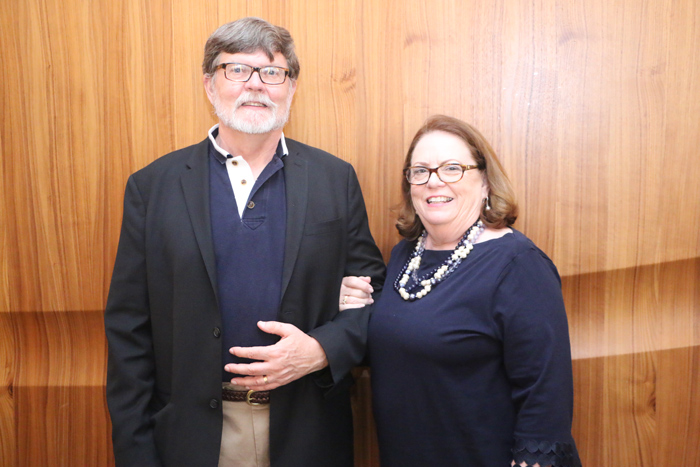Wil Scott '72

Wil Scott '72, with his wife, Sienna.
Donor Q&A
Tell us about your career. What does a typical workday look like for you?
I retired from my career at the National Gallery of Art in May 2014. I was a program manager and then a department head for 25 of those years. Managing events and people is much the same in most situations when dealing with professionals in education, regardless of the subject area. I think the broader aspects of my daily routine are more significant, because they give a deeper understanding of why I chose a career only revealed to me by a liberal education at Dickinson.
Almost every day of my career, I was able to spend some time in the galleries with masterpieces of Western art of the Renaissance and post-Renaissance periods. Leonardo, Rembrandt, Monet, Cezanne, Picasso, Pollock and others were like constant companions and old friends. Added to this was the opportunity to meet and talk with the leading international scholars studying these artists, talk and learn from colleagues on the staff of the National Gallery, and, most importantly, share my knowledge and experiences with volunteers and visitors equally interested in these amazing works of art.
This was indeed a privilege.
Can you speak to how Dickinson’s useful liberal-arts education helped you in your life?
The "useful education" established by Benjamin Rush is, to me, difficult to quantify and measure. I'll answer in a broad attempt to capture what have been the most constant impacts of my Dickinson experience on me and my son. I was a double major in English and fine arts. My son majored in religion. I was more interested in the academic experience. My son was a four-year letterman and co-captain of the lacrosse team. We both enjoyed the social life of Dickinson, my son much more than me.
I left campus with a curiosity about the world, people with different cultures and experiences, and a commitment to make my community a better place. To that end, I have been a citizen planner, serving for 30 years on the Annapolis Planning Commission, the president of my homeowner's association, a PTA president, a baseball coach, the president of my county's arts council, a board member of the Maryland Federation of Art and the Mitchell Gallery of St. Johns College, an unsuccessful political candidate, and more. I hope my efforts have done some good in the community.
My son is having a successful career in the insurance industry. He has led regional offices in his company's claims division and currently heads a disaster-response team. He works with all types of people and deals with them openly and fairly, accepting them for the individuals they are.
I followed a career completely determined by my Dickinson experience in an obvious way. My son's path is less obviously defined by Dickinson, but I think equally determined by his liberal education. He transferred his ability to learn new material and to write and speak with clarity and purpose, as well as an openness to diverse people, into a business career uninflected by his major. If that isn't some indication of the "usefulness" of a liberal education, I think it's hard to find a better example.
What inspired your gift to Dickinson?
I'll be blunt about my giving. My parents divorced, while I was at Dickinson. My father had to be forced by a court order to contribute to my college education. I was fortunate to have aid from Dickinson and other sources that covered about 85% of my Dickinson expenses. Dickinson opened a new world to me, showed me a career path, and prepared me for a series of scholarships and fellowships that allowed me to pursue that career.
How could I not contribute?
Why do you feel that it is important to give back to Dickinson?
Institutions like Dickinson are a bulwark against the darkness in contemporary America. The ignorance, hatred and fear poisoning our civic life can only be halted by the type of comprehensive liberal education exposing young people to the diversity of human cultures and ideas possible at Dickinson.
What is your favorite memory from your time at Dickinson?
There are too many memories from my years on campus to single out one. Instead, I will mention my most memorable Dickinson moment. Nothing was more memorable than the day I was able to present my son with his Dickinson diploma.
Can you tell us about what you do outside of work—hobbies, interests, etc.?
I mentioned some of my outside activities earlier. Since retirement, the major change has been my involvement with fine art photography. During my graduate studies and career, I became increasingly involved with the history of photography and the study of masters of the medium. I began exhibiting my work about ten years ago. In that time, I've participated in shows in Canada, France, Switzerland, Hungary and throughout the United States. My website is www.wilscottproductions.com.
I continue to volunteer for various organizations in my community, and I spend time with my two grandchildren.
What is one piece of advice you would give to today’s students?
Today's students must know that Dickinson is a doorway to the world. Be open to new ideas and new experiences. Take chances. Take the hard course in something you are curious about, even if you know nothing about it. Talk to the classmate from another country. Try to meet someone with interests unlike yours. Study abroad. Your choices start a journey to your future. You get to make those choices. Don't let the opportunity pass.
LEARN MORE
Published August 4, 2020